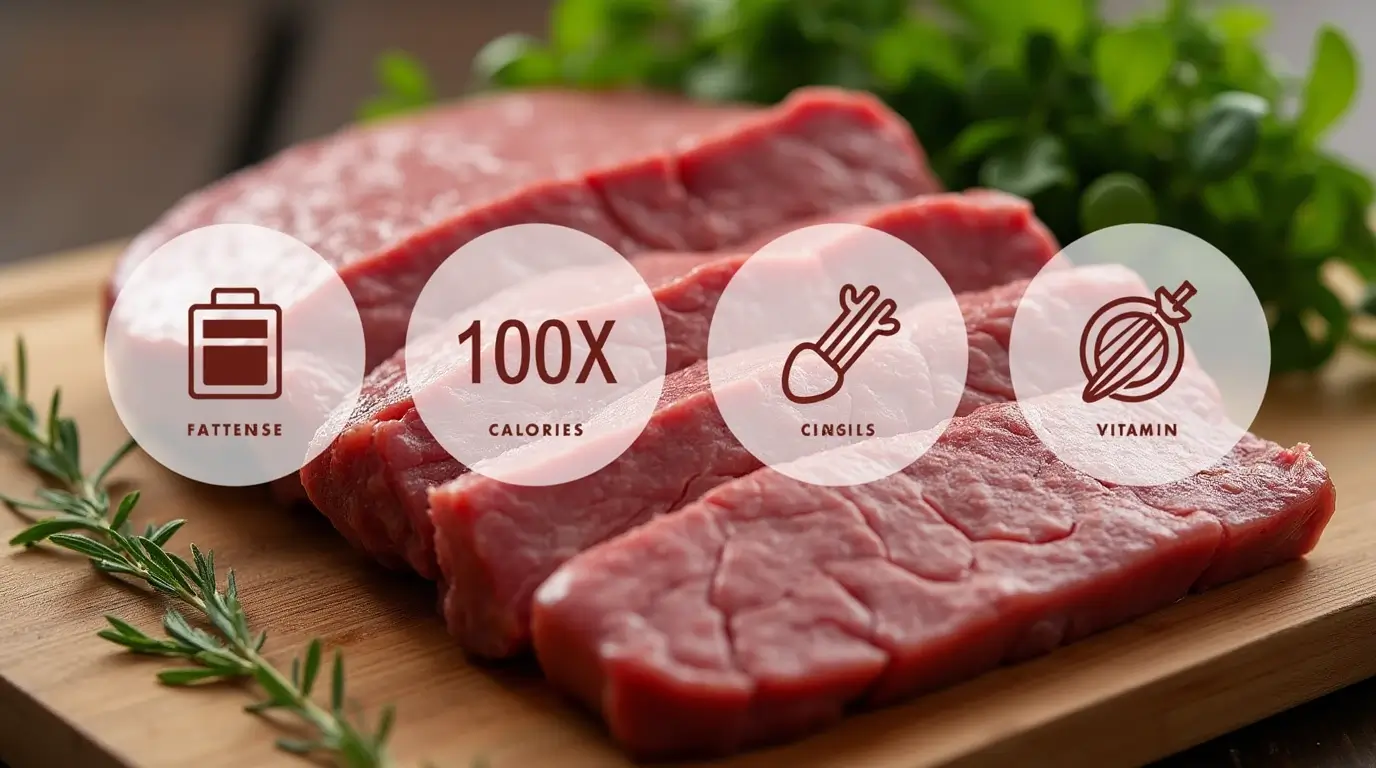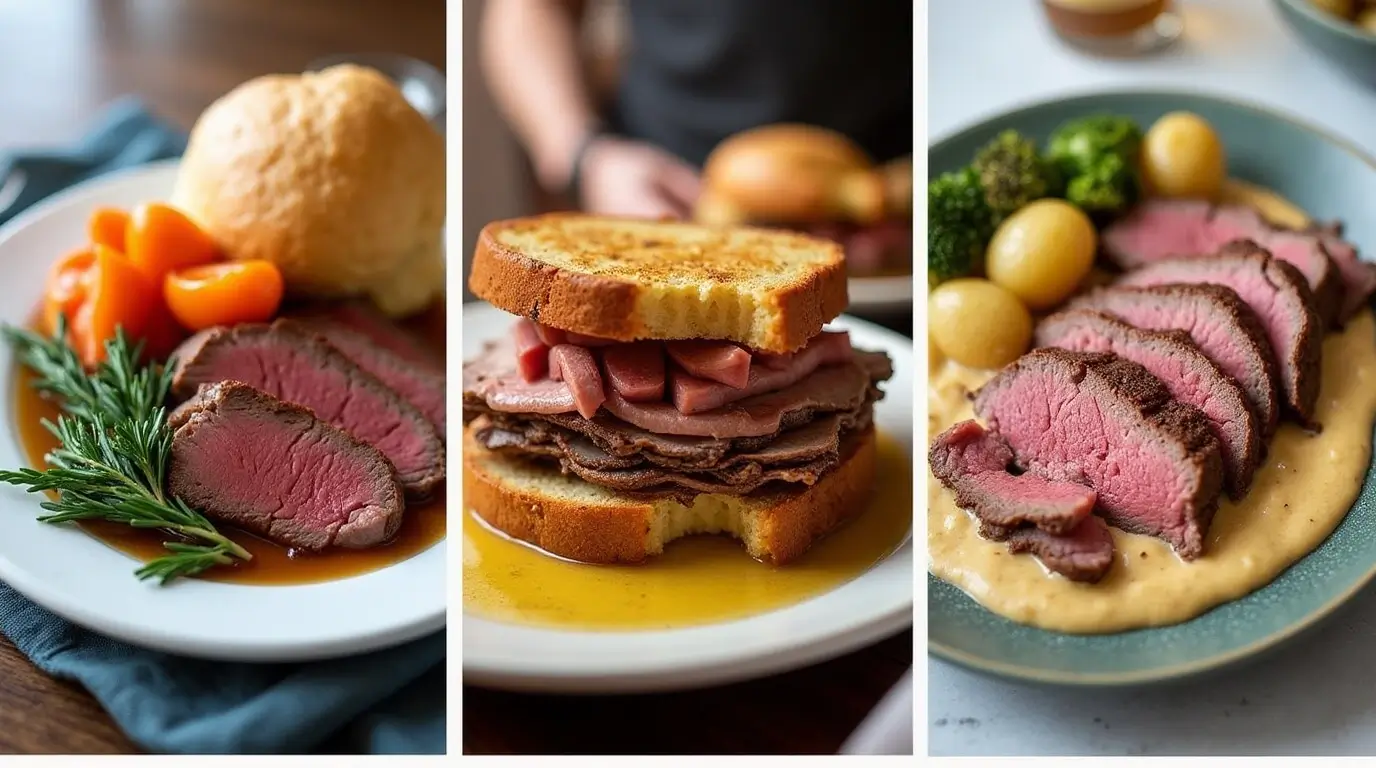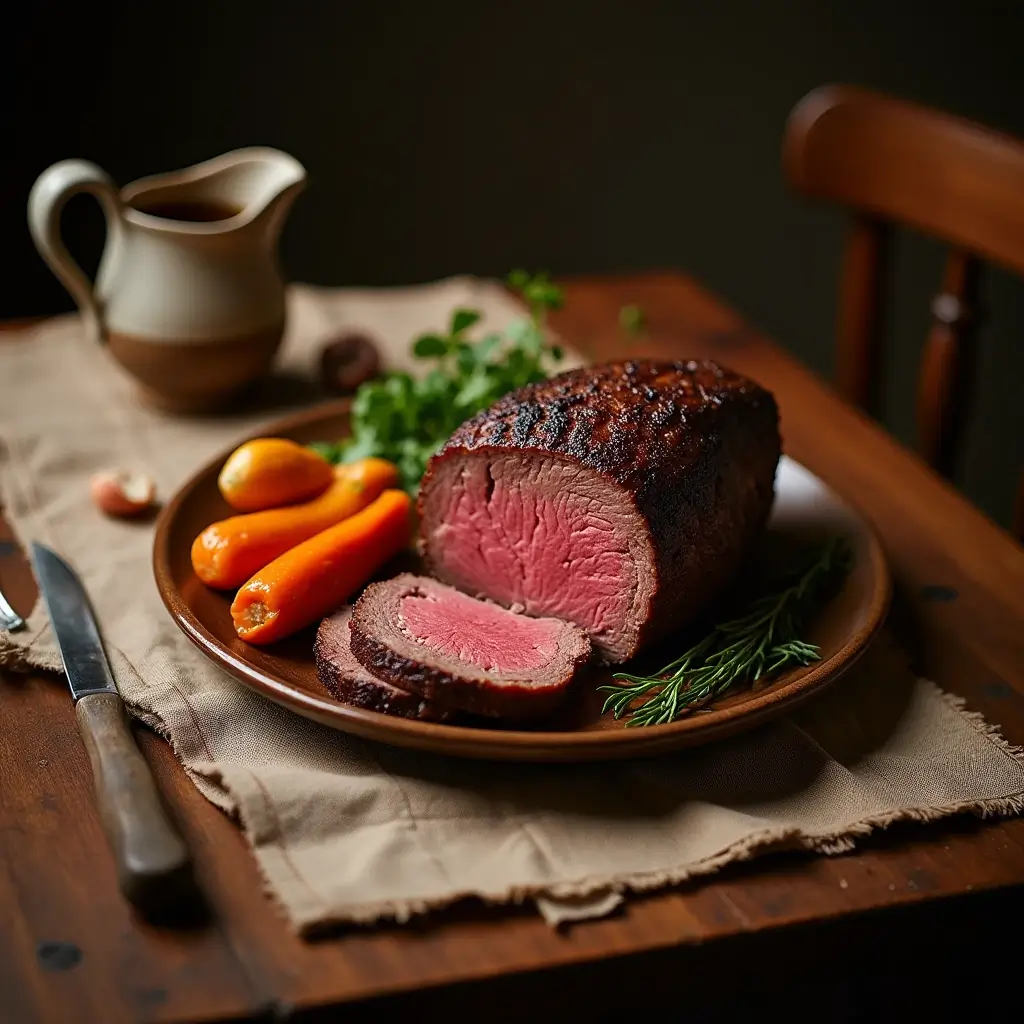Roast beef is more than just a delicious main course; it’s a nutrient-packed food that has been enjoyed across cultures for centuries. From its rich flavor to its versatile uses, roast beef holds a special place in many households. But its appeal goes beyond taste—it’s a powerhouse of essential nutrients that support your health and well-being. Whether you’re savoring a traditional Sunday roast or crafting a quick sandwich for lunch, roast beef delivers significant health benefits with every bite. Let’s explore what makes this classic dish a standout choice for your dietary needs and how it can help you thrive in your everyday life.
What Is Roast Beef? A Classic Dish with Nutritional Value
Roast beef has a rich history and is cherished worldwide for its versatility and flavor. This dish typically involves slow-cooking a large cut of beef, often seasoned with herbs and spices, to achieve tender perfection. The cooking process not only enhances its taste but also retains much of its nutritional value. Whether served as a main course or sliced thinly for sandwiches, roast beef offers a protein-packed addition to your meals. How it’s prepared can influence its nutrient content, making it a flexible option for various diets.

Nutritional Breakdown of Roast Beef Nutrition (Per 100g Serving)
A 100-gram serving of roast beef is a nutritional powerhouse. Here’s what you can expect in terms of essential nutrients:
| Nutrient | Amount (100g) | Daily Value (%) |
|---|---|---|
| Calories | 250 kcal | 12% |
| Protein | 27g | 54% |
| Fat | 15g | 23% |
| Iron | 2.7mg | 15% |
| Vitamin B12 | 1.9mcg | 80% |
This high-protein food is particularly rich in iron and vitamin B12, both essential for maintaining energy levels and supporting red blood cell production. The roast beef protein per 100g makes it an excellent choice for muscle repair and growth. With only 250 calories per serving, it’s a filling yet lean option, especially when compared to alternatives like ground beef, which often contains more fat.
The Health Benefits of Roast Beef
High-Quality Protein for Muscle Growth and Repair
Protein is a building block of life, and roast beef nutrition doesn’t disappoint in this area. With 27 grams of protein per 100 grams, it’s an exceptional choice for supporting muscle repair and growth. Athletes, bodybuilders, and anyone leading an active lifestyle will appreciate how roast beef delivers high-quality protein with minimal carbohydrates.
Rich in Iron and B Vitamins
Iron is crucial for carrying oxygen throughout your body, and roast beef provides a generous amount. The iron content in this dish helps combat fatigue and improves overall energy levels. Vitamin B12, another standout nutrient, supports brain function and keeps your nervous system in top shape. For individuals with deficiencies or those looking to boost their daily intake, incorporating roast beef into your diet can make a noticeable difference.
Boosts Immunity with Zinc
Zinc is a vital mineral for maintaining a strong immune system, and roast beef is a great source of it. A 100g serving can contribute to your daily zinc needs, helping your body fend off illnesses and heal wounds more effectively. Regular consumption in moderation can fortify your immune health over time.
Is Roast Beef Healthy for Everyone?
Factors to Consider for Different Diets
While roast beef nutrition 100g provides an impressive array of benefits, it’s important to consider how it fits into your specific dietary needs. For those following low-carb or keto diets, roast beef is an excellent choice due to its low carbohydrate content. Similarly, it aligns well with paleo diets, thanks to its natural, unprocessed nature. However, it’s worth noting that deli-style roast beef can contain higher levels of sodium, making homemade versions a healthier alternative.
Moderation Is Key
Despite its benefits, consuming roast beef in moderation is essential. The fat content, particularly saturated fat, can add up quickly if consumed in excess. Opting for leaner cuts and avoiding processed varieties ensures you’re reaping the benefits without overloading on less desirable components. Pairing it with fresh vegetables and whole grains can create a balanced, nutritious meal.
Ways to Include Roast Beef in a Well-Balanced Diet
Easy Roast Beef Recipes for a Healthy Meal
Incorporating roast beef into your diet doesn’t have to be complicated. Try this easy and nutritious recipe to kick things off:
| Ingredient | Quantity | Icon |
| Roast beef slices | 200g | 🥩 |
| Whole-grain bread | 2 slices | 🍞 |
| Fresh lettuce | 1 cup | 🥬 |
| Tomato slices | 2 | 🍅 |
| Mustard or hummus | 1 tbsp | 🥄 |
Layer the roast beef, lettuce, and tomato on the bread, and add a dollop of mustard or hummus for a flavorful sandwich. This recipe not only highlights the deliciousness of roast beef nutrition facts 100g, but it also ensures a balanced meal.

Roast Beef as a Versatile Ingredient
If sandwiches aren’t your thing, roast beef can be incorporated into salads, wraps, or even hearty soups. Shred leftover roast beef and mix it into a vegetable stir-fry for a protein-packed dinner. You can also pair it with quinoa or roasted sweet potatoes for a satisfying, nutrient-dense meal that meets a variety of dietary goals.
Homemade vs. Store-Bought Roast Beef Nutrition
When considering roast beef for your meals, the debate between homemade and store-bought options often arises. Homemade roast beef allows you complete control over the ingredients and preparation process, making it the healthier option for most people. You can choose lean cuts of beef, minimize added sodium, and season it to your taste using fresh herbs and spices. This ensures that your meal is free from preservatives and unnecessary additives often found in store-bought varieties.
Store-bought roast beef, on the other hand, offers unmatched convenience. Pre-cooked and pre-sliced options are widely available, making it an easy addition to sandwiches or salads when you’re short on time. However, these often come with added sodium and preservatives to extend shelf life. If you opt for store-bought, look for brands that prioritize quality and offer lower-sodium options to maintain the health benefits of roast beef.
By striking a balance between convenience and nutrition, you can decide which option works best for your lifestyle while still enjoying the benefits of roast beef nutrition.
Cultural Variations of Roast Beef Nutrition
Roast beef isn’t just a staple in one region—it’s a dish with variations that span the globe. In the United Kingdom, the traditional Sunday roast is a beloved family meal, often served with Yorkshire pudding, roasted vegetables, and a rich gravy. This version emphasizes hearty, comforting flavors that bring people together.
In the United States, roast beef sandwiches have become a classic, particularly in delis where thinly sliced roast beef is layered with cheese, horseradish, or mustard on fresh bread. This portable and flavorful variation is perfect for lunch or a quick bite.
In France, “rosbif” is typically served rare and paired with a creamy sauce or roasted potatoes. The French preparation highlights the natural flavors of the beef by keeping seasonings minimal.
Exploring these cultural variations can add excitement to your meals and inspire new ways to enjoy roast beef nutrition. Why not try preparing a roast beef dish inspired by another culture to diversify your cooking and palate?
How to Choose the Best Cut of Beef for Roasting
Choosing the right cut of beef is essential to achieving a perfectly cooked roast beef that suits your taste and dietary needs. Different cuts offer varying levels of tenderness, flavor, and nutritional value, so understanding your options can help you make the best decision for your meal.
Tender Cuts for Traditional Roasts
For classic roast beef recipes, tender cuts like the ribeye, sirloin, or tenderloin are excellent choices. These cuts are known for their rich marbling, which enhances flavor and keeps the meat juicy during roasting. While these cuts may be higher in fat, their tenderness and taste make them ideal for special occasions.
Lean Cuts for Healthier Options
For a leaner alternative, you might opt for cuts like the top round, eye of round, or bottom round. These cuts are lower in fat but still provide plenty of protein. They work well for slow roasting or braising to ensure the meat stays tender and flavorful. These cuts are also great for those focusing on the benefits of roast beef nutrition, as they deliver the protein you need without the added calories from fat.
Selecting Grass-Fed or Organic Beef
For an even healthier choice, look for grass-fed or organic beef. Grass-fed beef tends to be leaner and contains higher levels of omega-3 fatty acids and antioxidants, making it a more nutritious option. Organic beef, on the other hand, is raised without synthetic hormones or antibiotics, which can be important for those seeking a natural diet.
Matching Cuts to Cooking Methods
The cooking method also plays a role in choosing the right cut. For slow roasting, cuts like the chuck roast or brisket work well due to their higher fat content, which helps keep the meat moist. If you prefer quick roasting, opt for more tender cuts like the sirloin or tenderloin. Matching the cut to your cooking method ensures the best texture and flavor.
Comparing Roast Beef with Other Protein Sources
When evaluating roast beef nutrition, it’s helpful to compare it to other popular protein sources. For example, chicken breast is lower in fat but doesn’t offer as much iron or B12 as roast beef. On the other hand, ground beef often contains more fat unless you choose lean options. By understanding these differences, you can diversify your protein intake to suit your needs.
Roast Beef Nutrition FAQs
Is roast beef a good source of protein?
Absolutely. With 27 grams of protein per 100 grams, roast beef is an excellent protein source for muscle repair and overall health.
What’s the calorie count of roast beef?
A 100-gram serving contains about 250 calories, making it a nutrient-dense and satisfying option.
Is deli roast beef as nutritious as homemade?
Homemade roast beef typically has fewer preservatives and less sodium, making it a healthier choice.
How does roast beef compare to ground beef?
Homemade roast beef typically has fewer preservatives and less sodium, making it a healthier choice.
Can roast beef fit into a weight-loss diet?
Yes, when consumed in moderation and paired with low-calorie sides like vegetables, roast beef can be part of a weight-loss-friendly diet.
Key Takeaways Of Roast Beef Nutrition
- Roast beef is a versatile, nutrient-dense food that fits well into various dietary plans. It’s high in protein, iron, and B vitamins, making it ideal for muscle repair and energy.
- To maximize the benefits of roast beef nutrition, opt for homemade versions and pair them with wholesome sides.
- Moderation is key to enjoying roast beef as part of a balanced diet, ensuring you reap its rewards without overindulging.
Discover the satisfaction and health benefits of roast beef by including it in your meals today. Whether you’re crafting a hearty sandwich or serving it as a main dish, roast beef is a flavorful way to thrive. Take the next step in your nutritional journey and share your favorite roast beef recipes with friends and family!




